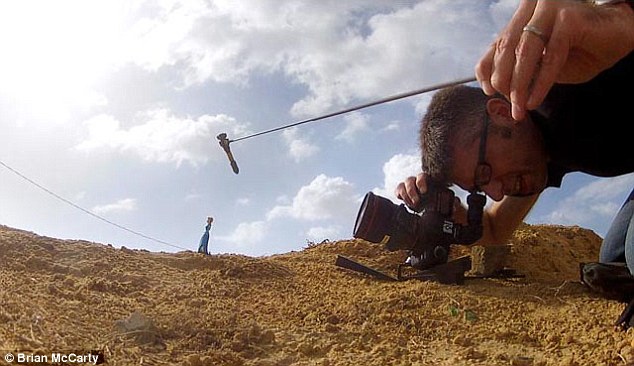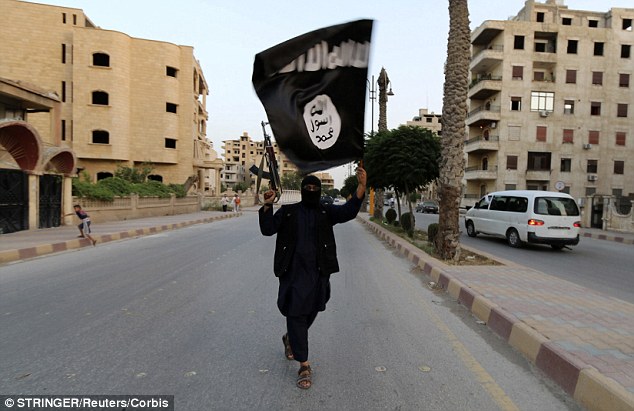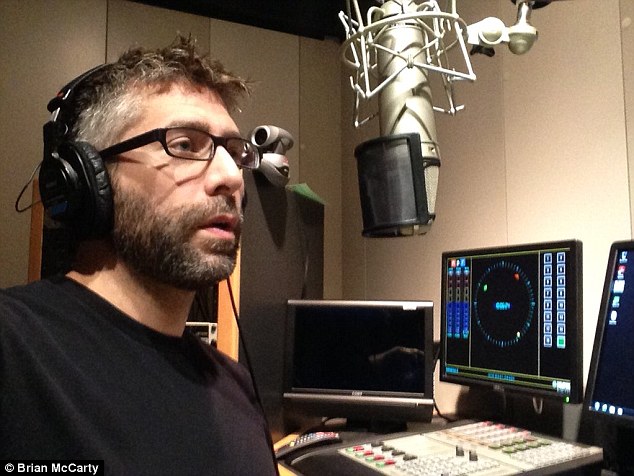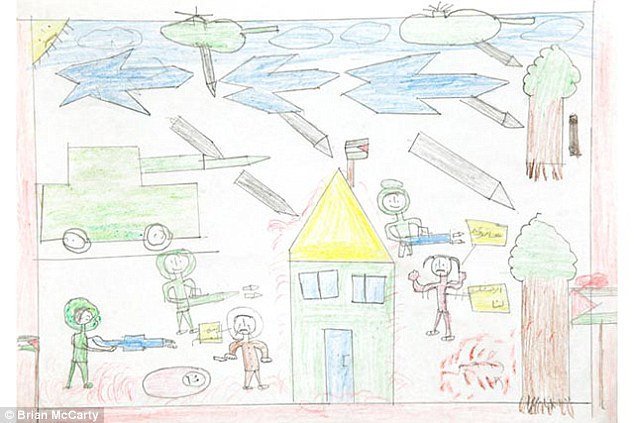- Brian McCarty’s photo depicts Cinderella with missiles falling overhead
- ISIS swapped the Cinderella figurine and replaced it with its black flag
- It is based on a drawing by a girl in Gaza and is meant to promote peace
- McCarty was stunned when he learned his photo was being used by ISIS
- Terror group had been using the image on social media sites for a year
- Photoshopped image continues to pop up on the internet, said McCarty
- For full coverage on the Islamic State visit http://www.dailymail.co.uk/isis
In today’s digital age artists are used to having their work stolen, but a California man was left stunned after he discovered ISIS was using one of his photographs to recruit new members.
Brian McCarty, from West Hollywood, was angry when he found out the terrorist group had stolen and digitally altered the image to use as propaganda.
The original photo depicted a tiny toy Cinderella with missiles falling over her head in a war zone, but in the doctored image Islamic State swapped the figurine for its black flag.

ISIS altered Brian McCarty’s photo (original at left) and used its own version (right) to recruit new members

McCarty is known around the world for his contemporary photos showing toy characters in real-life situations
ISIS had been using the image on social media, including Twitter, for about a year, but McCarty didn’t find out until he was alerted by Pixsy, a service that scours the internet for copyright violations.
The 41-year-old told MailOnline: ‘I expected to find commercial usage of my work, but this was the complete shock. Honestly at first it was so completely surreal, I didn’t know how to react.
‘It took some days to process and I’ve grown more angry and more outraged not at the theft but at the corruption of the message.’
McCarty, whose work will be displayed at London’s Serpentine Galleries next spring, is known around the world for his contemporary photos showing toy characters in real-life situations.
His photos, including many snapped in actual war zones, have appeared in books, and his four-year-old War-Toys project has toured the world.
The image that was lifted by ISIS was inspired by a drawing by a young girl from Gaza, who lived in fear of missile strikes, and was meant to promote peace, said McCarty.
He said: ‘This project is about children’s experiences of war and is anti-war. It’s very insulting to me and insulting to the intentions of the project.’

ISIS altered McCarty’s photo by swapping a Cinderella figurine with an image of its black flag

McCarty said neither he nor Pixsy made an effort to contact ISIS
McCarty and Pixsy contacted Twitter and other social media websites to have the Photoshopped image removed, but it continues to pop up from time to time, he said.
In a blog post, Pixsy said it can take legal action on behalf of its member photographers when their work is stolen, but it opted not to in this case as it would be ‘symbolic in nature’.
The blog stated: ‘With clear harm done to the photographer and a potential net worth of over $2 billion, the thugs at ISIS certainly have the means to compensate the photographer.
‘As egregious as the infringement is, however, neither Pixsy nor the photographer can accept money from a terrorist group.’

McCarty’s depiction of Cinderella in a war zone is based on the drawing of a young girl from Gaza

The artist, from California, has used toy characters to recreate drawings by children affected by war
McCarty said neither he nor Pixsy made an effort to contact ISIS.
He isn’t the only victim of the cyber campaign, as jihadis have hijacked tens of thousands of Twitter accounts after a drone attack killed a British Islamic State extremist, the Mail on Sunday reported.
The group called Cyber Caliphate was set up by Junaid Hussain, from Birmingham, England, to spread IS propaganda.
Hussain led the terror group’s computer hacking campaign until he was killed in a drone strike last August.

